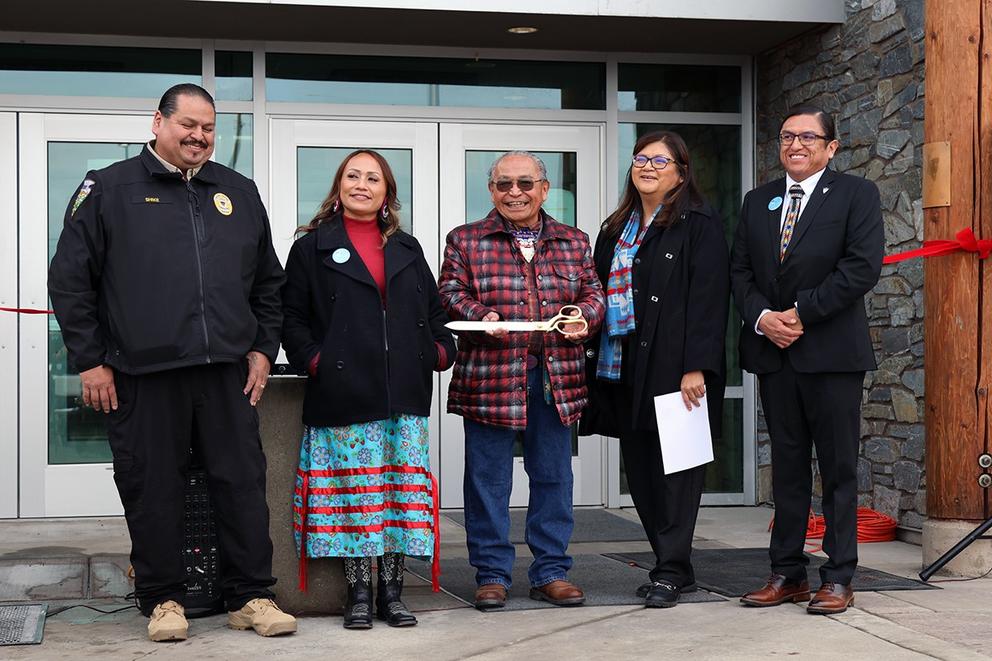Since the early 1950s when the Confederated Bands and Tribes of the Yakama Nation adopted its first written laws, the courthouse has been in the same building: A double-wide trailer surrounded by a cluster of additional trailers made up the police station, clerks’ offices and tribal court.
“It was old and never meant to be a courthouse,” said Tamara Saluskin, justice services deputy director for Yakama Nation.
Since 2012, Saluskin has played an instrumental role in fighting for the new building. In 2019, after three failed grant applications, the fourth and final one, through the U.S. Department of Justice, stuck. The grant helped fund the $13 million project, according to Jeremy Takala, chairman of the Yakama Tribal Council Law and Order Committee.
At the very end of a day marked with ribbon-cutting and ceremony, representatives from the Yakama tribal council honored five community members with a gifted blanket for their instrumental roles in the development of the new justice center. Among those honored were both Saluskin and her dad, Delano Saluskin, former chairman of Yakama Nation.
“I want to think about my daughter, Tamara,” he said. “She put her heart into this.”
Yakama Nation Tribal Justice System
Seven decades ago, Yakama Nation adopted its first written laws.
That same year – 1953 – Congress introduced Public Law 280, eroding tribal sovereignty in states where the law applied. Under Public Law 280, the federal government granted states the authority to exercise civil and criminal jurisdiction on reservations.
The law originally gave five states criminal jurisdiction on the reservations within their borders. Those states included: California, Minnesota, Nebraska, Oregon and Wisconsin. In later years other states, including Washington, adopted parts of the law.
Four years after Yakama Nation filed a petition for retrocession of Public Law 280 on its lands, the U.S. Department of the Interior instead approved retrocession of the law for the entire state of Washington.
By asserting its sovereignty in this way, the Yakama Tribal Court now has a greater ability to protect and govern its own citizens.
Tribal court is the backbone of exercising tribal sovereignty, according to Saluskin. This means holding the community accountable and upholding laws created by the Nation.
Yakama elder Sharon Goudy echoed this sentiment.
“Sovereignty means to me: We have the right to make our own laws, to govern ourselves and to exercise that,” she said.
The Yakama Tribal Court has a wide range of jurisdiction over criminal, civil and traffic matters within the Yakama Nation reservation.
The court also tries juvenile cases — those related to delinquency, dependency and truancy, according to Saluskin.
Since 2016, when it assumed additional jurisdiction after retrocession, Yakama Tribal Court decided to take a restorative-justice approach when working with youth.
“At all costs we want to divert them and use different methods so that they don’t even enter the system,” Saluskin said.
One of the restorative-justice approaches, a more traditional method of justice that the court has established, is an elders panel — a judge can refer youth to elders who oversee their case.
Though the elders panel has been an option in theory for years, at the old tribal courthouse there simply wasn’t enough room to operate it fully, according to Saluskin. One of the many benefits of the new space is that in addition to the three “Western” courtrooms, there is a room for more traditional justice practices. Saluskin is hopeful the elders panel will be a more viable option moving forward.
“The tenants of restorative justice have always been used in our tribal courts,” said Yakama Nation Tribal Court Chief Judge Ronna Washines.
Yakama Nation Public Safety Campus
The new Yakama Nation Public Safety Campus has long been a dream for many employees.
“That was not our future in those little tiny facilities,” Saluskin said. “I’m just glad that we’re here.”
In 2019, the Department of Justice awarded Yakama Nation a construction grant to build the new center. Delayed in 2020, the new center is finally able to open its doors.
Beyond a modernization of facilities — including being up-to-date on Americans With Disabilities Act accessibility standards and actually having bathrooms on site for the public — the new building will allow for an expansion of services.
Currently, four judges serve on Yakama Tribal Court. All four are citizens of Yakama Nation. To serve as a judge for the court, individuals must be enrolled members of a federally recognized tribe.
With the new facilities, the court is seeking to recruit one additional judge, so the court can take on even more cases. With more room, the court plans to provide more services for citizens of Yakama Nation, potentially including a drug court, a mental health court and a veterans court.
“The possibilities are endless,” Saluskin said.
Still in the final stages of construction, it will be a few months before the new facilities are fully up and running.
“Or you can come in as an inmate and have all the tours you want, aye,” Jerry Meninck, former tribal chairman and master of ceremonies, told the crowd during the opening event. He was met with a chuckle.
Though this new justice center represents a huge milestone for the Yakama Nation, it’s also an opportunity for continued growth, which includes expanding the police force by at least 74 new officers, according to Takala.
“We still have work to do,” Takala added.
This story was originally co-published on Dec. 15, 2023, by Underscore News and ICT, a news partnership that covers Indigenous communities in the Pacific Northwest.



